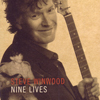STEVE WINWOOD : NINE LIVES
- I'm Not Drowning
- Fly
- Raging Sea
- Dirty City
- We're All Looking
- Hungry Man
- Secrets
- At Times We Do Forget
- Other Shore
Label : Columbia
Length : 57:16
Release Date : April 29, 2008
Review (AllMusic) : Steve Winwood's Nine Lives marks a more organic return to recording. This will be good news for those who live for any resurrection of rock heroes from days of yore, and bad for those who loved his hit singles in the 1980s and '90s. Seven of these nine cuts resemble (at least partially) those found on his last album, the brilliant About Time issued in 2003. The latter was a barnstormer of a rhythm and rock album (feels like Traffic meets Santana) that never got its proper due. Winwood produced this set for his debut on Columbia. He plays loads of Hammond B-3 and guitar, but also has a small core band that includes Jose Pires de Almeida on guitar, drummer Richard Bailey, Karl Van Den Bossche on percussion, and Paul Booth on reeds and woodwinds. Those seeking an album that resembles the surprise radio hit "Dirty City" (featuring Eric Clapton as a guest) aren't quite getting that. For the most part, Nine Lives begins as an introspective and reflective album that eventually cooks its way through restrained but inventive Afro-Latin grooves, bluesy, funky B-3, and acoustic and electric rock guitars. Just as often, however, that same blend of rhythmic invention graces lithe, deeply reflective tunes that address some very adult issues: separation, loss, reunion, spiritual redemption, and epiphany. The opening cut is the stripped-to-the-bone acoustic blues "I'm Not Drowning" with Winwood playing all the instruments. It's a gentle but effective blues moaner. Its 12-bar structure, hosts a memorable acoustic guitar lick that's ready-made for sampling. It's followed by "Fly," a nearly eight-minute tome that wouldn't have been out of place on Arc of a Diver if it'd had an unplugged element. Think of Robbie Robertson's solo material, or even the Blue Nile's sparse elegance on its debut album, and you can find a place for this gorgeous midtempo ballad with a sweet soprano saxophone line that leads into the melody. Winwood's voice is so rich here, it's capable of breaking your heart with its unsullied, beaten, and broken but unbowed spirit. The lyrics are almost holy in their expression of hope (more so than optimism) -- a hope that leads to a love that cannot be defeated. The album's single, "Dirty City," offers Clapton's most emotionally involved guitar playing in well over a decade; too bad he didn't play like this for the slumber-worthy Cream reunion. His sense of economy makes possible his actual feel for the guitar entering into the tune, and he basically makes it happen. But he has some real help from Van Den Bossche's djembes and congas, and a five-note, two-chord organ vamp from Winwood. When Mr. Slowhand takes his solo about six minutes in, its nasty sting is startling and raises the tension and release of the song as it eventually goes to fade about two minute later (it also makes the listener wonder where the hell he's been all these years and why his own records don't reflect this much invention and heat). The next track, the deeply spiritual "We're All Looking," is a funky, jazzed-up rocker with searching lyrics and a tremendously soulful presence in Winwood's voice; his singing is beautiful and powerful on Nine Lives -- time has not had its way with the thin yet authoritative and yearning luster in the grain of it. Winwood is singing his ass off, with plenty of deep soul. Here again it's important to note that Van Den Bossche's percussion in this ensemble, and on these songs in particular, cannot be overstated. It lends a certain flight-worthy expansiveness to Winwood's organ playing, and frees Bailey's drums to explore in many of these highly nuanced, nocturnal, funky cuts (check "Hungry Man," where the doubled-up polyrhythms between the two drummers create a vibe Winwood can dig deep into and then soar with, on both the Hammond and in his vocals). Those percussion elements are what make these often lyrically introspective tunes jump to life. Van Den Bossche is also one of the reasons that About Time was such a killer. Carlos Santana might gnash his teeth over not getting to play on this recording -- his influence is all over it. The flute break blended with bubbling congas, djembes, and funky guitars on "Secrets" will make it desirable to beat hunters everywhere. Think of Herbie Mann and Wes Montgomery with Mongo Santamaria playing on Traffic's Low Spark of High Heeled Boys album, and you get the picture. The final two tracks, and the other bookend, as it were, include one of the jauntiest, funkiest numbers on the set in "Sometimes We Do Forget," with a groove that is simply infectious with a bumping guitar and bassline. The closer, "Other Shore," is the only cut that recalls Winwood's early solo records, but it's sparse despite its beautiful, easy R&B lilt. Again, redemption for oneself, for others, for a love that has endured the goodbyes, and the letting go that ushers in a new "hello." This is pop music with soul, with grit and the grains of revealed truth pouring from Winwood's mouth, not as a survivor but as a man who has seen enough of life to know that the sun really does rise in the morning. Nine Lives is deeper, heartier, and braver lyrically than anything he's ever done. Musically, its only rival is About Time, but it's more reflective and gentler, without giving up any of the hunger which that album evidenced. This is not a comeback; it's instead a rediscovery from one of our most gifted singers, songwriters, and truth-tellers.
